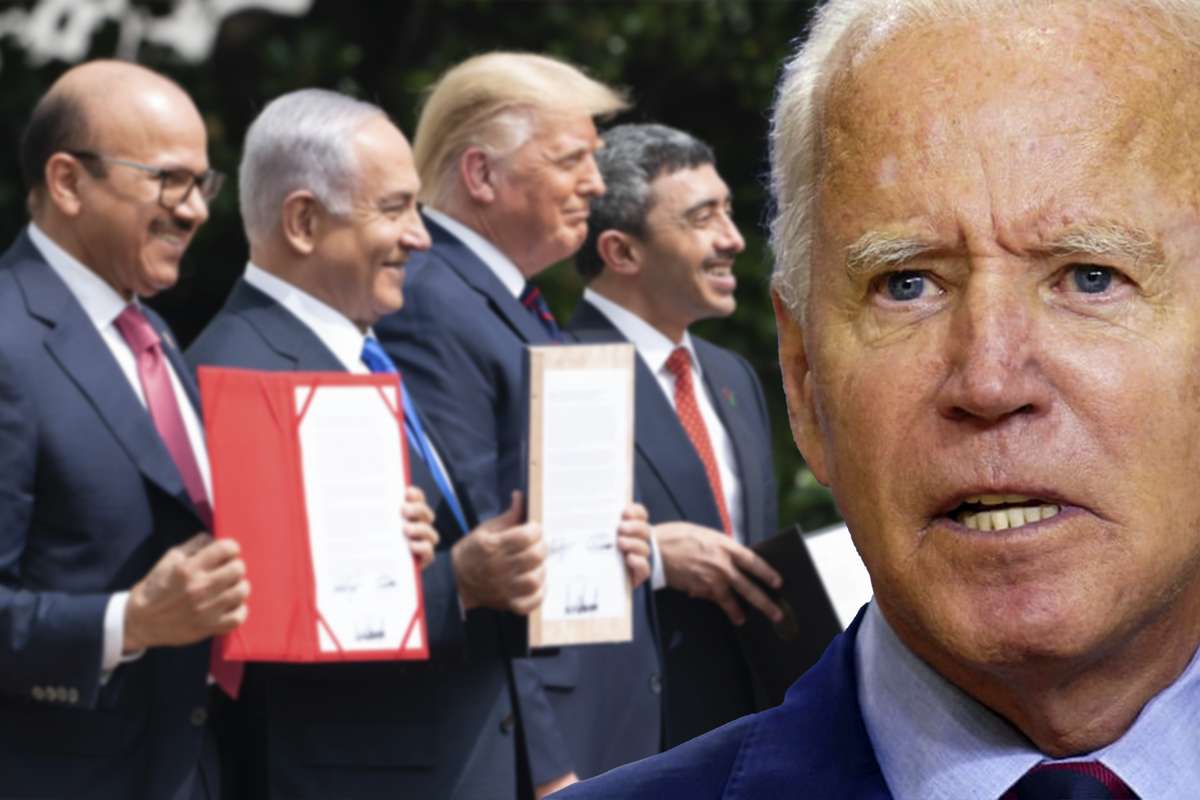The “Abraham Accords” are a brand created by the Trump administration that stands for something meta-historical, transformative, biblical, and even religious..
Last week, Bahrain appointed its first ever ambassador to Israel. Last month, the UAE appointed its first ambassador to Israel. Historic occasions, no doubt.
One would think that the United States of America, Israel’s best friend, and the godfather of the “Abraham Accords” that launched Israel’s new peace accords with Bahrain, the UAE, Sudan, and Morocco, would celebrate these moments.
But not the new Biden administration. It has done everything it can to downplay the ties between Israel and the Gulf. Answered laconically to the appointment of the ambassadors of Bahrain and Emirates: “The normalization between the Arab capitals and Israel will open new horizons throughout the region. The United States will continue to help support these important agreements. “
Take a look at the two missing words in the Washington press release, which were uttered through clenched teeth by a low-level spokesperson: The “Abraham Accords.”
You see, the “Abraham Accords” are a brand created by the Trump administration that signifies something metahistoric, transformative, biblical and even religious. It is a brand that is no longer allowed by the Biden administration. Instead, the administration prefers the dry and derogatory vocabulary “these important agreements.”
In fact, the administration appears to be pouring a jug of cold water on the Abrahamic Accords, joining the party poopers on the Israeli left and the bitter left-wing diaspora Jews, who despised the Accords when they were first announced. last summer.
At the time, it was difficult for these spoilers to say anything positive about the exciting events. Instead, they took a curmudgeon approach, attributing sinister intentions to the great diplomatic achievement.
There were several reasons for the grumpy responses: Because neither then-President Trump nor Prime Minister Netanyahu could do any good in the eyes of their political opponents; because the United States promised diplomatic or defense “goodies” to each of the Arab countries involved, and this was said to be “sneaky”; because the Accords divert attention from the supposed “urgent need” to give the Palestinians a state of their own; and because the Accords demonstrated that (as Netanyahu has long argued) only a strong and successful Israel will bring peace, not an Israel that bows its head and pleads for peace with the Palestinians at any cost.
To all this grumpiness, the Biden administration has now added a significant factor: its passionate, even desperate desire to renew President Obama’s nuclear deal with Iran. Therefore, anything that angers Iran – such as the “Abraham Accords” – is prohibited.; or at the very least, it must be diluted.
The Iranians correctly understood the “Abrahamic Accords” not only as a gigantic win for everyone involved, but as a regional alliance against a common American-Arab-Israeli enemy: Iran.
The Iranians correctly understood that the “Abrahamic Accords” granted religious legitimacy to the Arab peace with Israel, by referring to the common Abrahamic heritage of Arabs and Jews, thus implicitly recognizing that Jews are originally from the Land of Israel.
The Iranians correctly understood the “Abrahamic Accords” as demonstrable proof that Israel is a force for good, knowledge, prosperity and stability in the Middle East. After all, that is why the Arab countries began to join Israel.
So, to appeal to the Iranians, the Biden administration has moved away from all these emphases. It moves away from the appellation “Abrahamic”. He does not speak loudly of Iran as a strategic danger, nor does he openly promote regional alliances against Iran. The administration has not actively and intensively pursued additional Arab-Israeli peace agreements, as far as I can tell. (There is, for example, no special US envoy for this purpose; certainly nothing on the level of a Jared Kushner.)
Even more obviously, the administration has suspended for its “review” the benefits promised to the Arab countries that make peace with Israel, such as the sale of F-35 aircraft to the Emirates and the recognition by the US of Western Sahara as sovereign territory of Morocco.
The United States has also started beating Saudi Arabia and Egypt for their human rights record (while keeping silent on Iran’s most egregious human rights violations). It has ended US support for Saudi Arabia’s war against Iranian-backed rebels in Yemen – a war that has huge strategic implications. It has used the term “occupied territories” again in relation to Judea and Samaria. (See the State Department’s annual report on human rights around the world, released this week.)
All this, once again, to win Iran’s favor and signal Washington’s willingness to offer Tehran a soft deal as soon as possible. (Fortunately for Israel, and for the long-term security of the West, Iran is not taking the bait.)
The behavior of the Biden Administration demolishes the Abrahamic Accords and raises doubts that the “Abrahamic narrative” can grow beyond its current contours.
Why should the Saudis, for example, take one more step towards Israel, if Washington sees it with a bad eye (again, because it would anger the Iranians)?
Why should the Omanis improve their relationship with Israel if Israeli leaders cannot help negotiate better ties for Muscat in Washington?
Why should the Indonesians reach a normalization agreement with Israel if the Biden administration is not really enthusiastically on board?
And what will become of the authentic discourse of religious restraint and open-mindedness that underlies the Emiratis and Bahrainis’ quest for peace with Israel?
How can it spread beyond these countries to other Arab states when the world’s leading promoter (supposedly) of democracy and religious tolerance places little importance on these values in its foreign policy and instead seems to rush towards it? Another deal with the ayatollahs of radical Islamist and hegemonic Iran?
–


